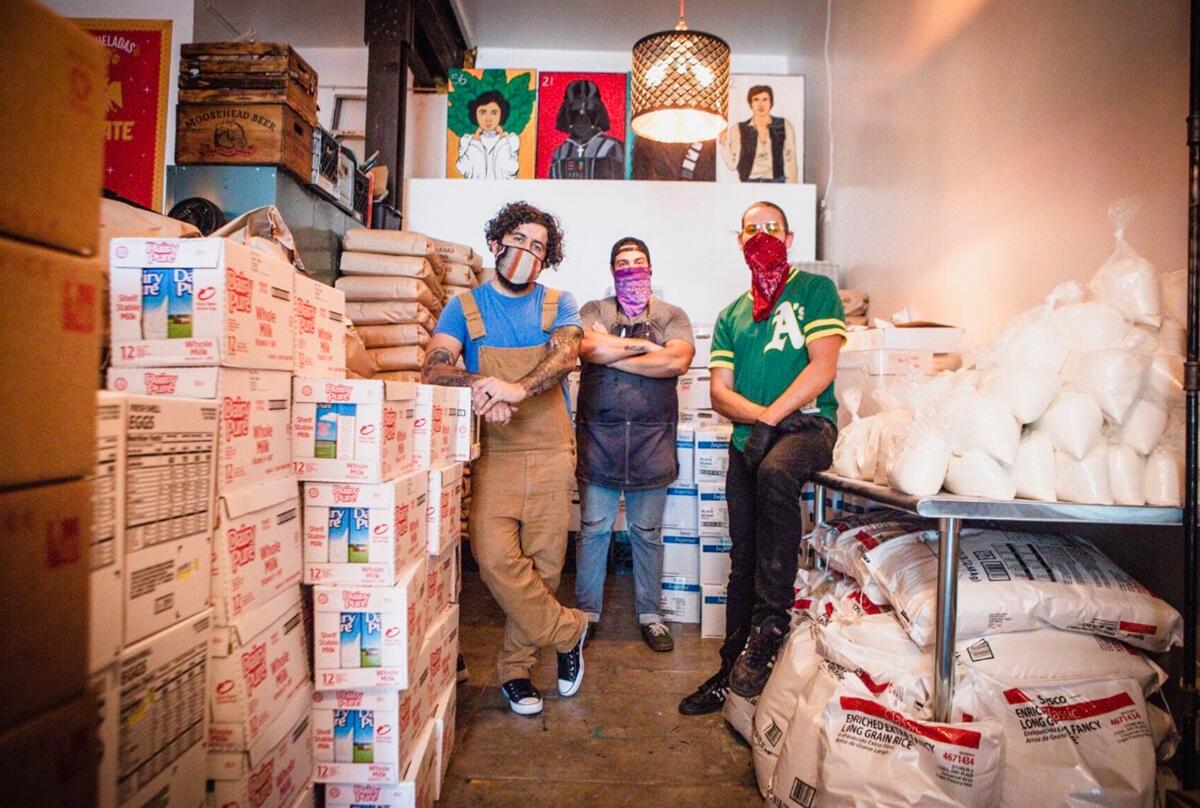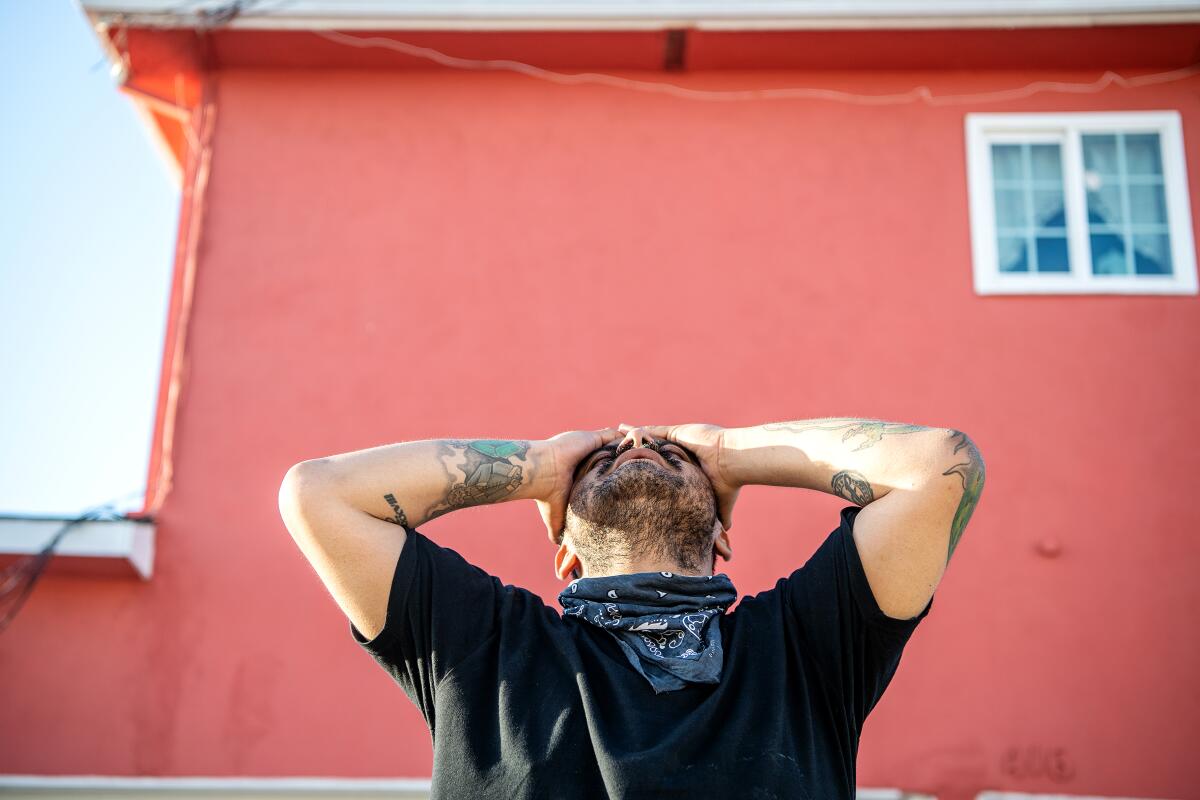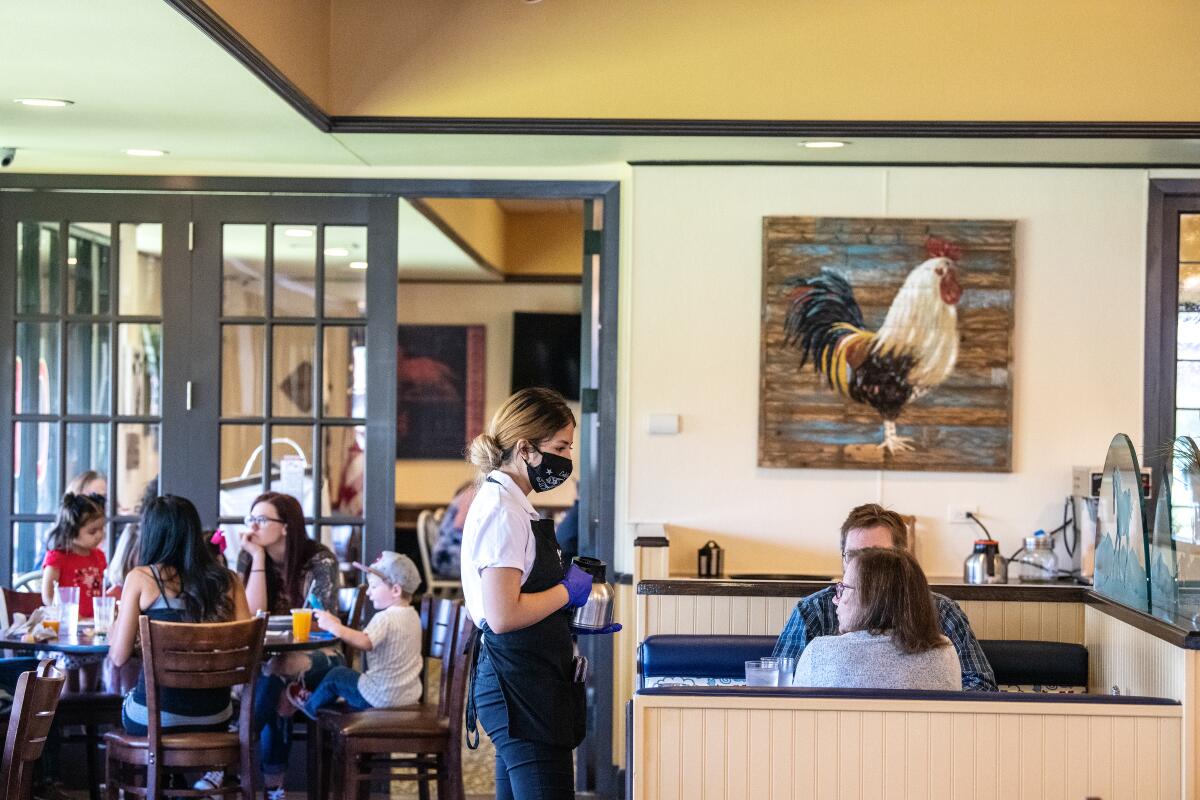Six ways to help California’s vulnerable restaurant workers

- Share via
Recently I wrote about Tony Ruiz and Oscar, two restaurant workers in L.A. facing extreme economic insecurity after losing their jobs to the coronavirus shutdown. Because they are undocumented, Tony and Oscar have no access to unemployment insurance, federal stimulus relief or other basic features of the American safety net.
Eat your way across L.A.
Get our weekly Tasting Notes newsletter for reviews, news and more.
You may occasionally receive promotional content from the Los Angeles Times.
I’m grateful to Tony and Oscar for the brief yet unvarnished glimpse into their personal and working lives; they are just two of about 2.2 million undocumented workers in California who paid $2.5 billion in state and local taxes last year, according to Gov. Gavin Newsom.
On Monday, California rolled out a landmark $75 million emergency relief program aimed at helping these workers.
The Disaster Relief Assistance for Immigrants fund, which is expected to provide one-time $500 cash grants for individuals and $1,000 for families, has gotten off to a bumpy start, including jammed-up phone lines and crashed websites.
Moreover, the emergency aid is expected to reach only about 150,000 people in need. Lucas Zucker, policy director at the Ventura-based nonprofit CAUSE, quoted in the Guardian, described the fund as “a Band-Aid on a chest wound.”
My inbox is overflowing with emails sent in response to Tony’s and Oscar’s stories. Some of you wrote in to sound off on illegal immigration. Many of you wrote in with some variation on the same question: What can I do to help?

I was struck by the pervasive sense of helplessness in many of these messages. It reminded me of something that Damian Diaz of the Boyle Heights bar consulting group Va’La Hospitality told me during a recent interview.
“Helping doesn’t have to be rocket science,” he said.
With bars closed, Diaz and business partners Aaron Melendrez and Othón Nolasco found themselves suddenly unemployed. They noticed that many emergency relief efforts aimed at hospitality workers were excluding undocumented restaurant workers. They felt moved to act.
The trio pooled together personal savings and committed to feeding a few dozen undocumented workers from their network of industry contacts. It started with a handful of food boxes assembled in a Boyle Heights warehouse; last week, No Us Without You fed more than 300 families.
Enjoying this newsletter? Consider subscribing to the Los Angeles Times
Your support helps us deliver the news that matters most. Become a subscriber.
“We often get messages from people in New York or Miami asking us: ‘How are you guys doing it? Do you have a chapter in other cities?’ Diaz said.
“The pointers I give people are simple: Put up whatever money you have. If you’re a server or bartender, call up your restaurant friends and ask for a dollar from everyone. Before you know it, you have $60 to put together a grocery box of oranges, potatoes, bread and shelf-stable ingredients.
“Reach out to your staff that you used to work with. Odds are there’s at least one individual who is undocumented and desperately needs your help.”
Diaz, Melendrez and Nolasco are not getting paid; unemployment benefits and donations sustain their efforts.
“I’m proof you don’t need to be rich to help. Compassion is free. It costs zero dollars to be nice to people,” Diaz said.
Most organizations helping undocumented workers during the COVID-19 pandemic also are working at the local level. If you want to help, these six California groups are accepting donations.
No Us Without You. The L.A. group is evolving into a nonprofit organization that’s committed to feeding undocumented workers for the foreseeable future, Diaz said. A $33 donation provides one food box per week for a family of four.
California Immigrant Resilience Fund. Part of a public-private partnership with Gov. Gavin Newsom, the fund feeds into 40 community nonprofit groups providing direct cash assistance to undocumented workers experiencing financial hardship.
UndocuFund. Established in 2017 to help undocumented families in Sonoma County deal with the aftermath of wildfires, the fund has been reactivated to help undocumented workers reeling from the COVID-19 crisis. The fund has inspired an offshoot: UndocuFund SF, which aims to help the estimated 224,000 undocumented immigrants in the San Francisco metro area.
Street Vendor Emergency Fund. Organized by the L.A. community development nonprofit group Inclusive Action, the fund is providing $400 cash grants to out-of-work street vendors, many of whom are undocumented.
SDIRC Immigrant Relief Fund. A project of Alliance San Diego, the fund provides grants of up to $500 to immigrants in San Diego County who have lost their income due to the coronavirus pandemic.
Have a question for the critics?
Our stories
— Is there a place for things like “art” and “creativity” in food during a global crisis? Read Bill Addison’s beautiful profile of Vespertine’s Jordan Kahn, who is turning out remarkable takeout during the pandemic.
— This week, L.A. moved to cap fees on food delivery services such as Uber Eats and Postmates. Emily Alpert Reyes reports on what this could mean for restaurants and delivery drivers.
— Gustavo Arellano gives us a look at the new normal inside a beloved Placentia sports bar.
— Did you catch Ben Mims’ excellent round-up of the best recipes for baking with spring farmers market produce? (Sign up for our brand new Cooking newsletter so you don’t miss any more.)
— Jenn Harris interviews Wolfgang Puck, who has a lot to say about how the COVID crisis is affecting the restaurant industry.
— Garrett Snyder reports on the scene inside the Original Pancake House in Norco, which reopened last week.
— Finally, Genevieve Ko has your next quarantine cooking project: homemade noodles.

Eat your way across L.A.
Get our weekly Tasting Notes newsletter for reviews, news and more.
You may occasionally receive promotional content from the Los Angeles Times.



